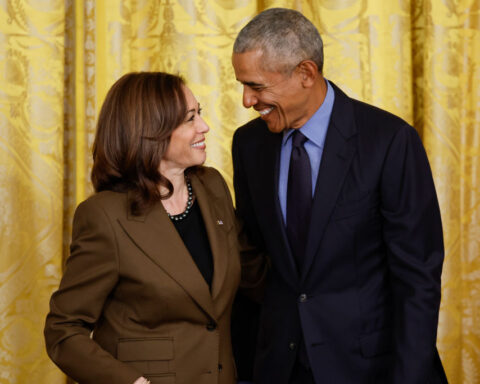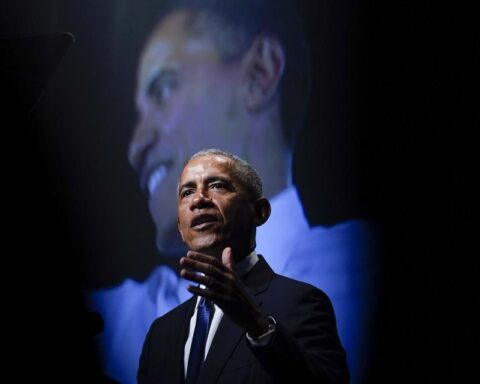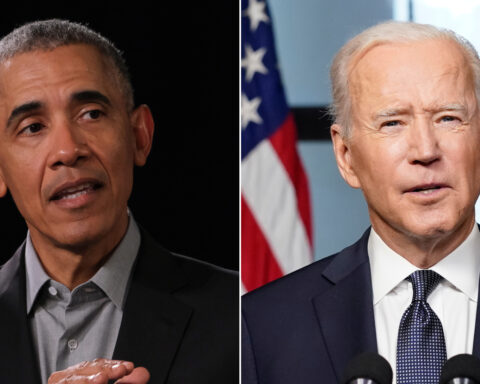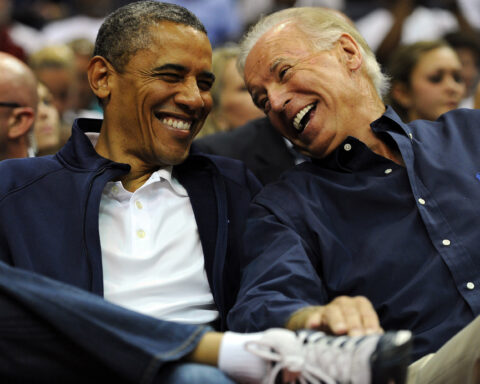“All of us as citizens have to recognize that the path towards an undemocratic America is not gonna happen in just one bang,” Barack Obama said in an arresting interview with Anderson Cooper on Monday night. It happens “in a series of steps,” Obama said, citing the devolution of places like Hungary and Poland.
So how can it be avoided? That was one of the major themes of Cooper’s hour-long interview. Obama cited “structural barriers to our democracy working better” like the filibuster and partisan gerrymandering. But he repeatedly brought up the media, as well. He raised this question: “How do we start once again being able to tell a common story about where this country goes?” Obama said elected officials, the media, and corporations all have an “important role” to play. And he brought up the “nationalization” problem, a term I’m hearing more and more often.
Obama wasn’t talking about the state taking control of private industry. He was talking about what happens when Sinclair, for instance, lards its “local” newscasts with national political stories instead of the community news that binds viewers together.
“Part of it is the nationalization of media, the nationalization of politics,” Obama said… “You know, you used to have a bunch of local newspapers, local TV stations. People weren’t having these highly ideological debates, but they were kinda more focused on what’s happening day to day.”
This harkens back to a study I mentioned last week about a newspaper that started printing op-eds only about local issues. Political polarization “slowed significantly” in the community, compared with a nearby area that didn’t change a thing.
Obama said “part of it is also the structure of our economy and our communities,” with increased stratification and segregation. Combine that with “the siloing of the media,” he said, “so you don’t have just Walter Cronkite delivering the news, but you have 1,000 different venues — all that has contributed to that sense that we don’t have anything in common. And so, so much of our work is gonna have to involve not just policy. But it’s also, how do we create institutions and occasions in which we can come together and have a conversation?”
“Shared stories”
This exchange between Cooper and Obama also stood out to me:
Cooper: “One of the things you write, ‘We need to explain to each other who we are and where we are going.’ I mean, as somebody who has dedicated myself to storytelling, that really resonates with me. But I wonder, we — are we as a country still willing to listen to each other’s stories?”
Obama: “Well, I think that this is the biggest challenge we have… We don’t have the kinds of shared stories that we used to.”
This exchange made think about a man who recognized me from TV and yelled epithets when I stopped at a suburban garden shop to pick up flowers for my daughter’s birthday. Would he have listened to my story? If he’d known why I was there, would he have suspended his stream of bile? I don’t know — I had to leave the shop.
“The infrastructure for democracy”
The proliferation of partisan media outlets and the shredding of nonpartisan local news have a lot to do with this. “The nationalization of everything means that there is constant fuel for the grievance fire,” The Dispatch’s David French wrote last week, dubbing it the “nationalization of outrage.” When you see Fox News fixate on some over-the-top policy at a random private school in New York, that’s the nationalization problem in a nutshell. “We know more about the interior lives of other people than ever before, and we’re very upset about it,” Jane Coaston of the NYT commented.
Conversely, local news has been shredded, which frays the bonds between people in communities. On Sunday’s “Reliable Sources,” Steven Waldman made the case for including local news aid in the infrastructure bill. “It’s the infrastructure for democracy,” he said, “and it’s crumbling also.” Here’s what he said.
The media’s small-d democratic role
“America needs a huge coalition of small-d democrats — Democratic, Republican and independent — to come together to stop this anti-democratic drift,” Perry Bacon Jr. writes in his latest for WaPo. He argues that “democracy erosion” is the most important story right now, so “we” — meaning citizens — “need the media to permanently adopt the avowed pro-democracy posture it took as President Donald Trump sought to overturn the 2020 election.”
“That doesn’t just mean covering the GOP’s anti-democratic drift negatively, but also covering it constantly,” Bacon Jr. writes. Plus, he says, news outlets need to center “more of their political coverage in the states,” since that’s where anti-democratic laws are being proposed and passed…
Something to ponder…
In the coming days, we’re going to learn more about what led up to the January 6 attack at the Capitol. We’re going to hear about security failures, communications failures, poor governmental planning, and more. Here’s a factor that shouldn’t be overlooked: Right-wing media. In my book “HOAX,” which comes out in paperback on Tuesday, I ask: Could the insurrection have possibly happened without Rupert Murdoch’s propaganda machine of a network? And I conclude that the answer is no, it could not have. Fox warped American politics for 20+ years and created the climate for a riot of lies.
This subject came up during Cooper’s interview with Obama, too. Regarding the Big Lie, Obama said, “the base believed it. The base believed it because this had been told to them not just by the president but by the media that they watch. And nobody stood up and said ‘Stop. This is enough. This is not true.'”
Obama then corrected himself and said a small number of GOP leaders did speak the truth, and were vilified for it.







